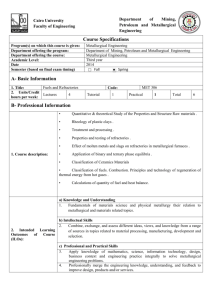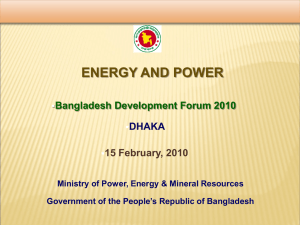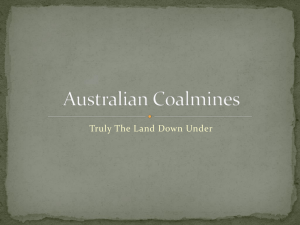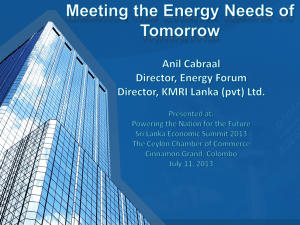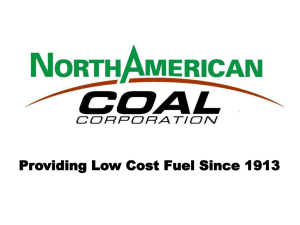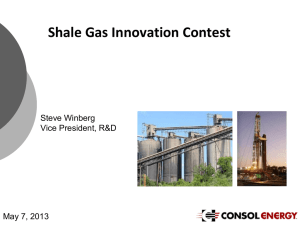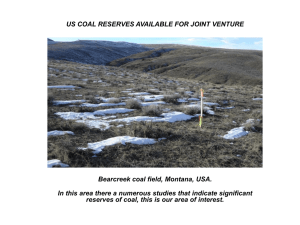Installation Practices at Mines - Moranbah North
advertisement
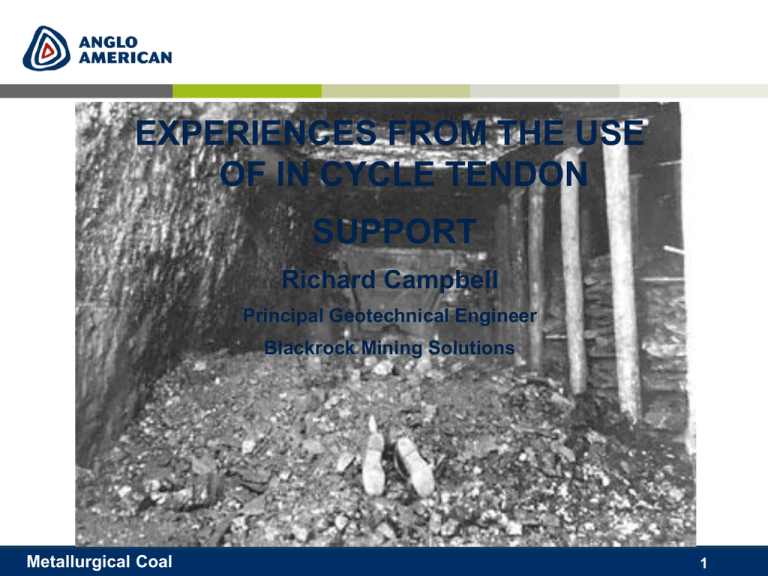
EXPERIENCES FROM THE USE OF IN CYCLE TENDON SUPPORT Richard Campbell Principal Geotechnical Engineer Blackrock Mining Solutions Metallurgical Coal 1 AGENDA • Context • Installing long tendon support on advance • What the operators see as the risks in the process • Opportunities to minimise the risks • Geotechnical considerations 2 Metallurgical Coal CONTEXT As coal miners we are all aware we have two masters, two things that rule our business; 1. Safety of our operators & operations 2. Longwall Float or Continuous LW Production = sustainable & profitable business 3 Metallurgical Coal CONTEXT Sustainable business. Everyone in this room will appreciate the current and ongoing battle between Development meters V’s Longwall retreat metres = LONGWALL FLOAT Increasingly the trend we are seeing is Development is losing the race. The current push for more LW cutting hours, we are seeing across the various major companies is increasing the gap between LW and Development. Perceived delays of any sort in the Development process is coming under intense scrutiny – installing long tendons in cycle is a target 4 Metallurgical Coal CONTEXT Changing Conditions With Australian Longwall mines facing increased geotechnical challenges, poorer conditions – perhaps needing tendons on advance in code GREEN TARP conditions just to maintain safe working conditions and the on going need to increase development rates the need to install long tendon support on advance is becoming increasing topical and the focus of optimisation. Also coal mining in Australia is going through a series of changes is the quest for more coal at lower costs, and recovering coal in new & some times difficult deposits. All mines seem to want to go to longer and wider LW panels (6km now, 8km soon). – Not many 300-400m wide x 6km or 8km blocks exist in nature with 5 no structure or zones of poor strata conditions. Metallurgical Coal 6 Km + CONTEXT 6 Metallurgical Coal ASK THE OPERATORS When asked “what would make it safer and easier to do?” Installing long tendon support on advance in the development cycle is a potential hazard to our operators – some operations do not allow post groutable bolts to be installed off the CM. A review of tendon installation related injuries and discussions with operators identifies the following issues: •Physically demanding tasks, in a confined work area of the bolting platforms on a CM •Repetition, multiple drill rods to get to 4m, 6m, 8m up to 14m •Pushing resin to the back of the hole Metallurgical Coal 7 ASK THE OPERATORS When asked “what would make it safer and easier to do?” Inserting the bolt into the hole, stiff cables need to be bent around the drilling masts & manually pushing them up the hole, getting the bolt into the chuck. Attaching the jewellery Using the tensioning device, • Typically heavy & needs to be lifted above shoulder height • High pressure hydraulic lines Crush and laceration of fingers & hands type injuries Strains and sprains, backs & shoulders – heavy lifting, positioning of people Hydraulic injection from the tensioning unit Tensioner getting stuck on the bolt Metallurgical Coal 8 ASK THE OPERATORS When asked “what would make it safer and easier to do?” Reinstalls at the last moment in the bolt install process The cable end gets jammed in the dolly, splits the welds, cant get the tensioner on the bolt………………. START AGAIN – re install, This is a cause of a great deal of grief & rework with the crews. Two causes identified. 1. In the dollies cable spline is not robust, various type/brands on the market none are human proof. 2. The drill pots rotate as the drill motor & mast are dropped, if the dolly is attached this causes the welds to split. Needs to be fixed for optimal install process. 9 Metallurgical Coal OPPORTUNITIES When asked “what would make it safer and easier to do?” The following were identified as opportunities Remove the need for a tensioner – torque tensionable bolts Can we get enough tension on them, is 15+t needed? Optimise drilling tips to the actual strata conditions, faster drilling Cable feeders to do the grunt work of getting the bolt in the hole. Resin insertion – not fool proof Grouting – Is cement type material the best product to use Replace it with something quicker and faster setting. If on TARP red is it 24 mins, 24 hrs 48 hrs or 7 days before the grout is hard enough to work under? Metallurgical Coal 10 OPPORTUNITIES When asked “what would make it safer and easier to do?” The following were identified as opportunities TARP related support plans that use point anchored tendons (say 6m long), then if triggers are reached the next level uses post grouted tendons (say 8m long) – can one bolt do both? The difference in 2m of drilling is not an issue, pulling back the CM or stopping to put them in with an air track is an issue. Capacity of the bolts Grout tubes – how to ensure they survive Are cables the right tool? Extendable self drilling steel bolts (kind of like the old “coupled bolt”) In hard rock they use a continuous roll of cable, automated feed and length cut off at the hole – why don’t we? 11 Metallurgical Coal GEOTECHNICAL Its always a battle between not enough & too much Metallurgical Coal 12 GEOTECHNICAL 13 Metallurgical Coal GEOTECHNICAL Are tendons the right tool for the job. – Point anchored tendons v’s fully encapsulated • Can we fully resin encapsulate a 6m or 6m long flexi bolt off a CM? – How stiff are they, • How far can they stretch? • What’s acceptable strain/deformation on a tendon? – Pretension • How much is enough/to much Are tendons on advance really there just to slow the movement down? – Secondary support next to follow? – Or are they the final fix? 14 Metallurgical Coal

